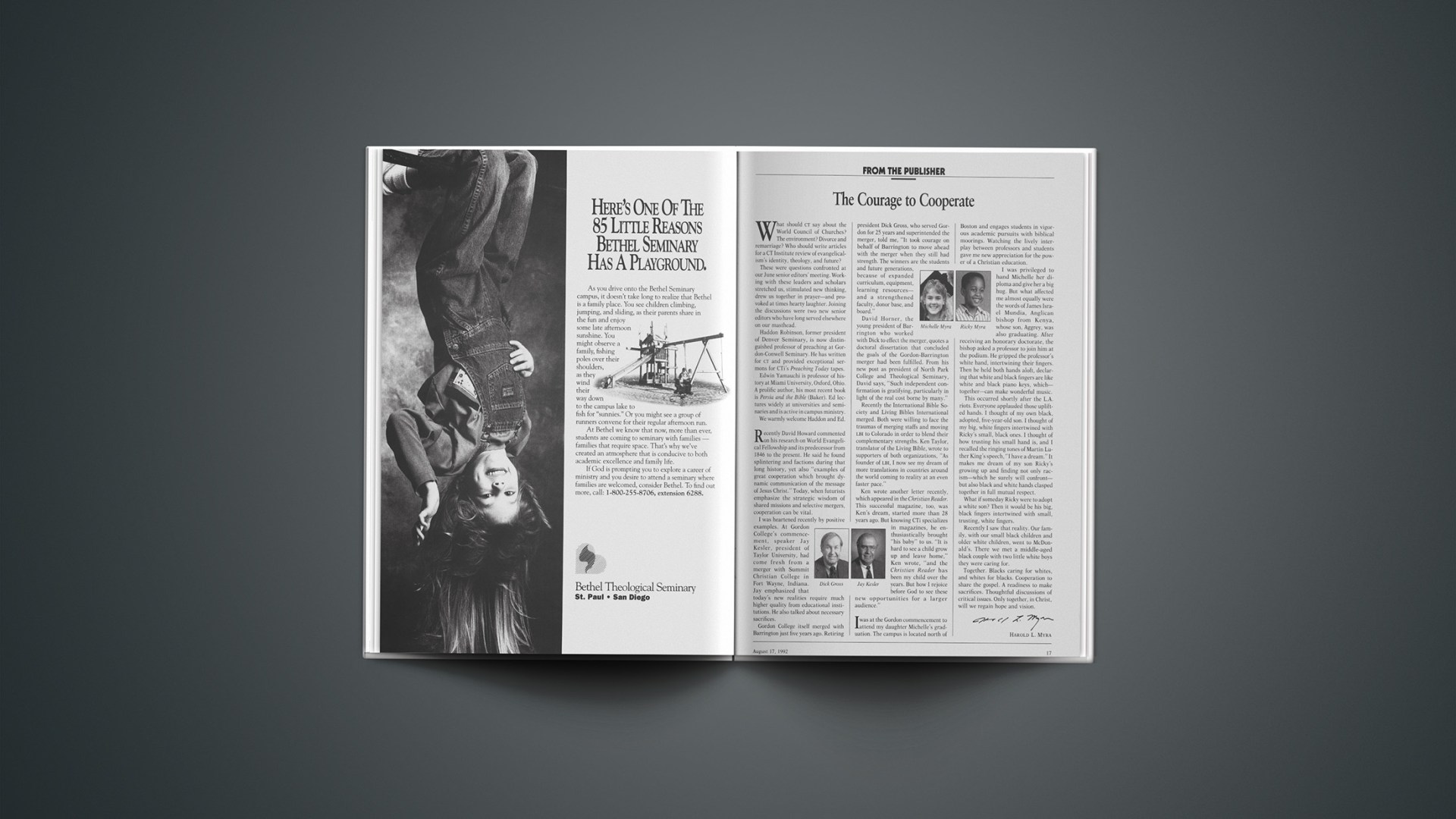What should CT say about the World Council of Churches? The environment? Divorce and remarriage? Who should write articles for a CT Institute review of evangelicalism’s identity, theology, and future?
These were questions confronted at our June senior editors’ meeting. Working with these leaders and scholars stretched us, stimulated new thinking, drew us together in prayer—and provoked at times hearty laughter. Joining the discussions were two new senior editors who have long served elsewhere on our masthead.
Haddon Robinson, former president of Denver Seminary, is now distinguished professor of preaching at Gordon-Conwell Seminary. He has written for CT and provided exceptional sermons for CTi’s Preaching Today tapes.
Edwin Yamauchi is professor of history at Miami University, Oxford, Ohio. A prolific author, his most recent book is Persia and the Bible (Baker). Ed lectures widely at universities and seminaries and is active in campus ministry.
We warmly welcome Haddon and Ed.
Recently David Howard commented on his research on World Evangelical Fellowship and its predecessor from 1846 to the present. He said he found splintering and factions during that long history, yet also “examples of great cooperation which brought dynamic communication of the message of Jesus Christ.” Today, when futurists emphasize the strategic wisdom of shared missions and selective mergers, cooperation can be vital.
I was heartened recently by positive examples. At Gordon College’s commencement, speaker Jay Kesler, president of Taylor University, had come fresh from a merger with Summit Christian College in Fort Wayne, Indiana.
Jay emphasized that today’s new realities require much higher quality from educational institutions. He also talked about necessary sacrifices.
Gordon College itself merged with Barrington just five years ago. Retiring president Dick Gross, who served Gordon for 25 years and superintended the merger, told me, “It took courage on behalf of Barrington to move ahead with the merger when they still had strength. The winners are the students and future generations, because of expanded curriculum, equipment, learning resources—and a strengthened faculty, donor base, and board.”
David Horner, the young president of Barrington who worked with Dick to effect the merger, quotes a doctoral dissertation that concluded the goals of the Gordon-Barrington merger had been fulfilled. From his new post as president of North Park College and Theological Seminary, David says, “Such independent confirmation is gratifying, particularly in light of the real cost borne by many.”
Recently the International Bible Society and Living Bibles International merged. Both were willing to face the traumas of merging staffs and moving LBI to Colorado in order to blend their complementary strengths. Ken Taylor, translator of the Living Bible, wrote to supporters of both organizations, “As founder of LBI, I now see my dream of more translations in countries around the world coming to reality at an even faster pace.”
Ken wrote another letter recently, which appeared in the Christian Reader. This successful magazine, too, was Ken’s dream, started more than 28 years ago. But knowing CTi specializes in magazines, he enthusiastically brought “his baby” to us. “It is hard to see a child grow up and leave home,” Ken wrote, “and the Christian Reader has been my child over the years. But how I rejoice before God to see these new opportunities for a larger audience.”
I was at the Gordon commencement to attend my daughter Michelle’s graduation. The campus is located north of Boston and engages students in vigorous academic pursuits with biblical moorings. Watching the lively interplay between professors and students gave me new appreciation for the power of a Christian education.
I was privileged to hand Michelle her diploma and give her a big hug. But what affected me almost equally were the words of James Israel Mundia, Anglican bishop from Kenya, whose son, Aggrey, was also graduating. After receiving an honorary doctorate, the bishop asked a professor to join him at the podium. He gripped the professor’s white hand, intertwining their fingers. Then he held both hands aloft, declaring that white and black fingers are like white and black piano keys, which—together—can make wonderful music.
This occurred shortly after the L.A. riots. Everyone applauded those uplifted hands. I thought of my own black, adopted, five-year-old son. I thought of my big, white fingers intertwined with Ricky’s small, black ones. I thought of how trusting his small hand is, and I recalled the ringing tones of Martin Luther King’s speech, “I have a dream.” It makes me dream of my son Ricky’s growing up and finding not only racism—which he surely will confront—but also black and white hands clasped together in full mutual respect.
What if someday Ricky were to adopt a white son? Then it would be his big, black fingers intertwined with small, trusting, white fingers.
Recently I saw that reality. Our family, with our small black children and older white children, went to McDonald’s. There we met a middle-aged black couple with two little white boys they were caring for.
Together. Blacks caring for whites, and whites for blacks. Cooperation to share the gospel. A readiness to make sacrifices. Thoughtful discussions of critical issues. Only together, in Christ, will we regain hope and vision.










